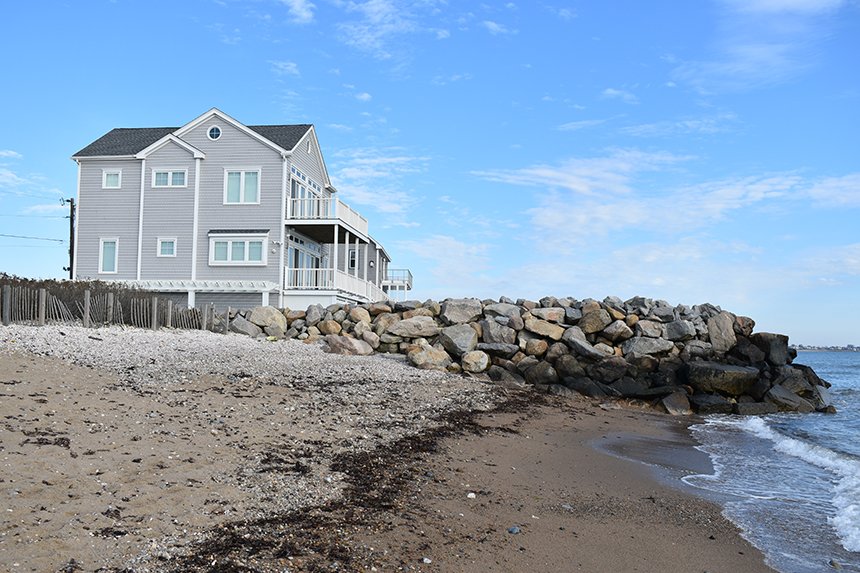Public Concerned About Ocean State’s Vanishing Shoreline Access
By ROB SMITH/ecoRI News staff
Rhode Islanders got their first crack at public comment at a recent meeting of the House commission to study shoreline access. Beachgoers and shoreline advocates shared their experiences of being arrested for trespassing, navigating Barrington’s arbitrary no-parking laws, and finding increased restriction to the coast by private landowners.
The 12-member commission was created by legislation passed in the
spring and introduced by now-chair Rep. Terri Cortviend, D-Portsmouth. Shoreline access is
enshrined in the Rhode Island constitution, and limited by legal precedent to
the mean high tide line, or mean high water (MHW). Advocates say limiting
access to the MHW denies people their rights; landowners claim anything else
encroaches on their property rights.
Barrington resident and shoreline advocate Ken Block described how his town government severely restricts access to the shore. The wealthy East Bay town, said Block, has blanketed all roads leading to six separate public rights of way to the shore with “no parking” signs.
According to data provided
by the town, all but six parking tickets issued between 2019 and June 2021 were
issued on streets with a public right of way. The remaining 352 tickets were
written in response to a resident calling to complain.
EDITOR'S NOTE: On Nov 2, the Boston Globe reported on the entrance of the RI ACLU into beach access litigation brought against Sarah McKenna of Pawtucket by Charlestown beach property owner James Marsh of Avon, CT. Marsh charges Ms. McKenna with trespass and libel for sunbathing in a spot she thought was below the mean high tide line. Marsh also claims Ms. McKenna libeled him by her description of their confrontation posted on a Facebook (Meta?) site.
The libel claim and the demand that Ms. McKenna remove all posts related to the dispute brought the ACLU in to defend Ms. McKenna using Rhode Island's anti-SLAPP law. SLAPPs are "strategic lawsuits against public participation." They used to be common but now are less so after many states. like Rhode Island, passed laws protecting free speech. -Will Collette
“The town has created an on-demand security service that only issues tickets when someone calls for enforcement,” Block said. He noted there were no parking tickets issued during the week of school graduation or the week of July 4.
Town officials cite safety concerns on narrow streets for the
no-parking signs, and advise beachgoers to park at the town beach. Critics of
the town’s policy say the streets are plenty wide enough to park safety and
note a lack of handicap parking spots at most rights of way.
Residents calling law enforcement is just as common for beachgoers already on the shoreline. Scott Keeley of Charlestown told commission members during the Oct. 28 meeting about the time he was arrested for criminal trespassing on a beach in South Kingstown.
On an early June day in 2019, Keeley
was walking in shallow water collecting seaweed on Charlestown Beach, before
crossing the town line into South Kingstown. Security hired by local beachfront
property owners informed him he was trespassing and asked him to leave. Keeley
maintained his constitutional right to the shore, and the security guard called
town police.
Keeley was arrested and charged, telling the officers
“constitutions can’t protect themselves.” The charges were dropped the next day
and his record was expunged the following week. Keeley sued the town and the
South Kingstown Police Department, eventually winning a $25,000 settlement. He
testified that common complaints from owners — such as opening up access will
allow people to host parties, keggers, or other related immoral or unlawful
activities — are “a diversion” from actual issues.
South Kingstown resident Conrad Ferlah said it was “not uncommon”
for nearby property owners to harass his family when they went to the beach,
even when accessing Rhode Island Department of Environmental Management sites
and public rights of way. He characterized state beaches as full, and other
beaches with restricted access as empty.
Mike Woods, chair of the Rhode Island chapter of Backcountry
Hunters & Anglers, spoke in support of widening shoreline access. He
stressed the need to fairly balance the rights of private property owners and
the public’s right to the shore, but noted the current setup unfairly favored
landowners. He said the near inability for the public to walk on dry sand under
the MHW standard meant the public’s right “qualifies as practically
nonexistent.”
Tom Greene told committee members that all possible identities
except the seaweed line were hard for casual beachgoers to determine. The
seaweed line, while easier, does not account for seaweed being pushed further
inland from storms.
Greene called the present water line identifiable and suggested
enacting into law instead a right of passage 4 feet from the current water
line. He said 4 feet is similar to the width of a sidewalk, and it would minimize
trespassing and property seizure.
The Shoreline Access Commission is scheduled to hold another
public comment session Nov. 18 at 3 p.m. at Chariho Middle School in Wood River
Junction.
